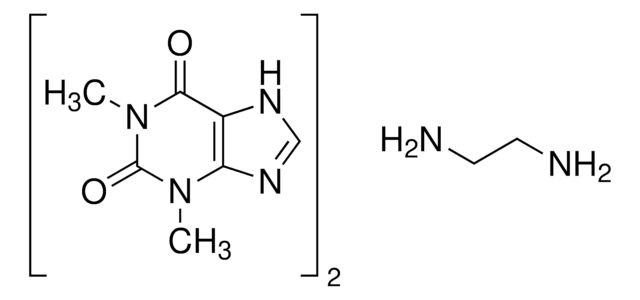1653004
USP
Theophylline
United States Pharmacopeia (USP) Reference Standard
Synonyme(s) :
1,3-Dimethylxanthine, 2,6-Dihydroxy-1,3-dimethylpurine, 3,7-Dihydro-1,3-dimethyl-1H-purine-2,6-dione
About This Item
Produits recommandés
Qualité
pharmaceutical primary standard
Famille d'API
theophylline
Fabricant/nom de marque
USP
Application(s)
pharmaceutical (small molecule)
Format
neat
Chaîne SMILES
CN1C(=O)N(C)c2[nH]cnc2C1=O
InChI
1S/C7H8N4O2/c1-10-5-4(8-3-9-5)6(12)11(2)7(10)13/h3H,1-2H3,(H,8,9)
Clé InChI
ZFXYFBGIUFBOJW-UHFFFAOYSA-N
Informations sur le gène
human ... ADORA1(134) , ADORA2A(135) , ADORA2B(136) , ADORA3(140) , PDE3A(5139) , PDE3B(5140) , PDE4A(5141) , PDE4B(5142) , PDE4C(5143) , PDE4D(5144)
Vous recherchez des produits similaires ? Visite Guide de comparaison des produits
Description générale
Application
- Aminophylline
- Aminophylline Delayed-Release Tablets
- Aminophylline Injection
- Aminophylline Oral Solution
- Aminophylline Rectal Solution
- Aminophylline Tablets
- Dimenhydrinate
Actions biochimiques/physiologiques
Remarque sur l'analyse
Autres remarques
Produit(s) apparenté(s)
Mention d'avertissement
Danger
Mentions de danger
Conseils de prudence
Classification des risques
Acute Tox. 3 Oral - Repr. 1B
Code de la classe de stockage
6.1C - Combustible acute toxic Cat.3 / toxic compounds or compounds which causing chronic effects
Classe de danger pour l'eau (WGK)
WGK 1
Point d'éclair (°F)
Not applicable
Point d'éclair (°C)
Not applicable
Certificats d'analyse (COA)
Recherchez un Certificats d'analyse (COA) en saisissant le numéro de lot du produit. Les numéros de lot figurent sur l'étiquette du produit après les mots "Lot" ou "Batch".
Déjà en possession de ce produit ?
Retrouvez la documentation relative aux produits que vous avez récemment achetés dans la Bibliothèque de documents.
Les clients ont également consulté
Notre équipe de scientifiques dispose d'une expérience dans tous les secteurs de la recherche, notamment en sciences de la vie, science des matériaux, synthèse chimique, chromatographie, analyse et dans de nombreux autres domaines..
Contacter notre Service technique









